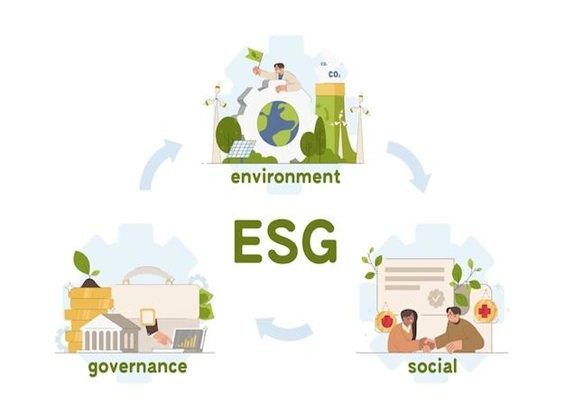Finance for the Future: Explore the Greener Side of Investing

Knowledge
- Advance understanding of concepts and principles of sustainable finance, including green finance, social finance, and impact investing.
- Gain knowledge of sustainable investment strategies, financial instruments, and regulatory frameworks.
Skills
- Develop skills in analyzing the financial performance of companies and investment portfolios through the lens of environmental, social, and governance (ESG) factors.
- Acquire skills in integrating ESG considerations into investment decision-making processes.
- Enhancing research and communication skills.
- Learning to tailor investment information for a broader audience.
- Gaining practical experience collaborating with media professionals.
Responsibility & Autonomy
- Independently analyze the financial and non-financial impacts of investment decisions on sustainability.
- Independently develop and implement sustainable finance strategies.
Usually, financial success means maximizing returns. Nowadays, people are looking for investments that align with their values. Sustainable finance offers a solution, allowing you to invest in companies that prioritize environmental and social responsibility alongside financial performance. An economically efficient, sustainable global financial system is a necessity for long-term value creation. Such a system will reward long-term, responsible investment and benefit the environment and society as a whole.
This WebQuest will challenge you to see finance differently, exploring how your investment choices can contribute to a more sustainable future. Get ready to discover how to thrive financially while making a positive difference.
You will have to collaborate with journalists or financial analysts from local media outlets to research and write investment reports on under-reported areas of sustainable finance. Select a specific area within sustainable finance that is under-reported or not well-understood by the general public (e.g., impact investing in developing countries, green bonds for clean energy projects in specific regions). Perform a research report and collaborate with the media partners to refine the report. The collaboration with the media partner should result in a well-written and insightful article or web content piece for the media outlet's audience.
Follow the steps listed below.
1. Team up!
Collaboration is key in the real world of finance! Form teams of four. Once you've found your teammates, move on to the next step!
2. Get an idea of Sustainable Finance
What is the definition of sustainable finance, and how does it differ from traditional finance? Explore the definition of sustainable finance and key terms, you may start by visiting the website of the Global Sustainable Investment Alliance (GSIA). Define greenwashing and understand its implications.
Sustainable finance encompasses three key areas: green finance, social finance, and impact investing. Research each area and identify the specific goals and types of investments associated with them.
In your own words, write a short paragraph explaining what sustainable finance is and its core objectives. Create a table summarizing the key points about the three pillars of sustainable finance.
Also, answer the question, how does sustainable finance potentially contribute to achieving the UN Sustainable Development Goals (SDGs)?

There isn't one single way to be an impact investor. Sustainable investors use various strategies to consider ESG factors. Explore the following strategies:
- Negative screening
- Positive screening/ESG integration
- Thematic investing
Briefly explain each strategy and provide an example of how it might be applied.
Sustainable finance utilizes numerous financial instruments to achieve its goals. Research the following:
- Green bonds
- Social impact bonds
- Microfinance
Describe each instrument and its role in promoting sustainable development.
Also answer the following questions:
- What are some of the potential benefits and risks associated with investing in sustainable companies or projects?
- Why invest responsibly?
- What is the role of financial technology (FinTech) in making sustainable investing more accessible to individual investors?
4. Putting Theory into Practice - Living Lab Activity:
Teams should select a specific area within sustainable finance that is under-reported or not well-understood by the general public, e.g.:
- Impact investing – while the general concept of sustainable investing is becoming more mainstream, the specific mechanisms and outcomes of impact investing are not widely understood. Many people are unaware of how impact investing differs from traditional forms of sustainable investment
- Green banking - while there is increasing awareness of green financial products, the broader concept of green banking and its implications for the financial system are less discussed. Many consumers and investors are not familiar with how their banking choices can impact sustainability.
- Climate risk disclosure - while there is increasing regulatory focus on climate risk disclosure, the concept and its significance are still not well understood by the general public.
- Biodiversity finance - while climate finance is gaining traction, biodiversity finance is still emerging as a concept. The link between financial activities and biodiversity loss is not as widely recognized or understood by the public.
- Just transition - the social aspects of sustainable finance, particularly the concept of a just transition, are often overshadowed by the environmental focus. There is limited awareness of how financial mechanisms can support a fair transition for all stakeholders.
The teams have to conduct research on the chosen area, analyze current trends and challenges and develop an investment research report that presents:
- A clear explanation of the chosen sustainable investment area.
- Investment opportunities and potential risks involved.
- Analysis of relevant data and case studies (if applicable)
- Recommendations for investors interested in this space.
Next, teams should contact relevant journalists, editors, or sustainability reporters at the chosen local media outlets. Briefly introduce the project and express your interest in collaborating. It would be best to partner with media outlets that focus on business, finance, or sustainability news. Identify journalists or analysts who are interested in exploring new perspectives within sustainable finance.
Teams should connect with their media partners to discuss the research progress and share drafts of their reports. Gain feedback from the media partners on the research direction, report structure, and language clarity for a general audience. Revise your research report based on feedback from media partners. Collaborate with media partners to determine the best format for presenting the research findings. This could be:
- An in-depth article for the media outlet's website or publication
- An interview with a student team member on the research topic
- Visuals like infographics or charts to enhance the media content
5. Publishing the article and wide dissemination
The media outlets will publish articles, interviews, or social media content based on the student teams’ research. Teams can participate in the dissemination by sharing the media content across their own networks and promoting it to colleagues and the wider university community.
Well done!
- Definition of sustainable finance and key terms - Global Sustainable Investment Alliance
- Sustainable Investing on Investopedia - Sustainable Investing
- Global Impact Investing Network - case studies by the Global Impact Investing Network will help you move from "what is it" to "how is it done".
- Forum for Sustainable and Responsible Investment (US SIF): US SIF (Offers resources on sustainable investing practices in the US)
- PRI (Principles for Responsible Investment): UN PRI (Provides a framework for integrating ESG factors into investment decisions)
- The Sustainability Accounting Standards Board (SASB): SASB (Develops industry-specific ESG disclosure standards)
- Introduction to Sustainable Investing - video - Introduction to Sustainable Investing
- Reuters Sustainable Business: Sustainable Business News | Latest Eco Headlines | Reuters (Focuses on news and analysis related to sustainability in businesses)
- Environment | The Guardian (Covers environmental news with a focus on solutions and sustainability efforts)
- Bloomberg Green (Provides in-depth news and analysis on the green economy and clean energy)
- There's a training gap in green finance and it could hold climate progress back - Here's how we fix the training gap in sustainable finance | World Economic Forum
- Unveiling the truth: greenwashing in sustainable finance (This article explores the different forms of greenwashing and the challenges of identifying truly sustainable investments)
- Are banks greenwashing with their 'green finance' claims?
- UN Sustainable Development Goals (SDGs) (Provides information on the 17 SDGs that guide global sustainability efforts)

- Definitions for Responsible Investment Approaches, CFA Institute, Global Sustainable Investment Alliance, and Principles for Responsible Investment., Report, article, video, project
- Climate Bonds Initiative - Promotes green bonds for climate-friendly projects, Initiative/Project
- Global Impact Investing Network (GIIN), Network
- Principles for Sustainable Investing - PRI is the world’s leading proponent of responsible investment, An investor initiative in partnership with UNEP finance initiative and the UN global compact for ESG integration
- Sustainability Accounting Standards Board (SASB), Industry-specific ESG disclosure standards
- Emerging Market Green Bonds Report
- Guidelines for Blue Finance, Guidelines
- The basic Green Finance Reference Guide
- Biodiversity Finance Reference Guide
- Progress Report on Greenwashing
- Guidelines on funds’ names using ESG or sustainability-related terms
- Sustainable Finance Roadmap 2022-2024, Roadmap
- What is ESG? Explained in 5 mins, ED4S Academy, Video
- What is Impact Investing? Video
- MSCI ESG Ratings website, Website
- Sustainalytics website
- European Securities and Markets Authority, Website
- ImpactAssets (Connects investors with impact investing opportunities), Website
Nestlé - Creating Shared Value Report
Nestlé regularly conducts a materiality assessment to identify where the company has the greatest impact on society and the environment, and the topics most important to the business success. The Nestlé Creating Shared Value Report 2023 serves as a real-world example of how a major corporation is applying principles of sustainable finance. While Nestlé's primary goal is to generate profit, the report demonstrates their commitment to integrating environmental and social factors alongside financial considerations. This aligns with the core concept of sustainable finance, which seeks to achieve financial returns while creating positive social and environmental impact.
Nestlé's 2023 Creating Shared Value and Sustainability Report highlights the company's efforts to address societal challenges while creating value for stakeholders. A key focus is regenerative food systems, aiming to make agricultural practices more sustainable. This includes initiatives like supporting farmers with water management techniques and promoting responsible sourcing practices. The report details progress on environmental metrics like reducing waste and water usage. It also outlines Nestlé's social commitments, such as ensuring access to nutritious food and promoting responsible marketing practices towards children. The document emphasizes independent assurance of the reported data, demonstrating Nestlé's commitment to transparency in its approach to sustainability.
Nestlé's efforts described in the document not only address environmental concerns and social issues but also contribute to long-term business sustainability. By focusing on responsible sourcing practices and building stronger communities, Nestlé can potentially secure a reliable supply chain, enhance brand reputation, and attract investors who prioritize ESG factors. This case study illustrates how sustainable finance isn't just about ethical investing but also about companies adopting practices that benefit both their bottom line and the world around them.
Link: Creating Shared Value and Sustainability Report 2023, Advancing regenerative food systems at scale
